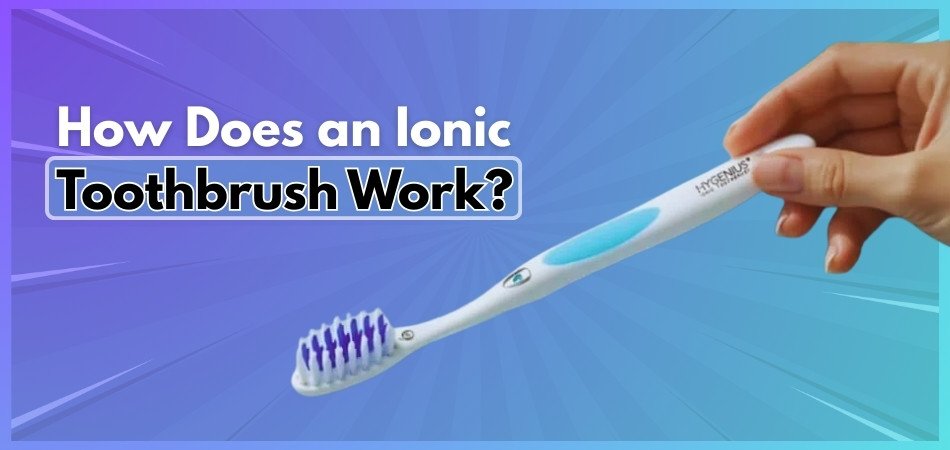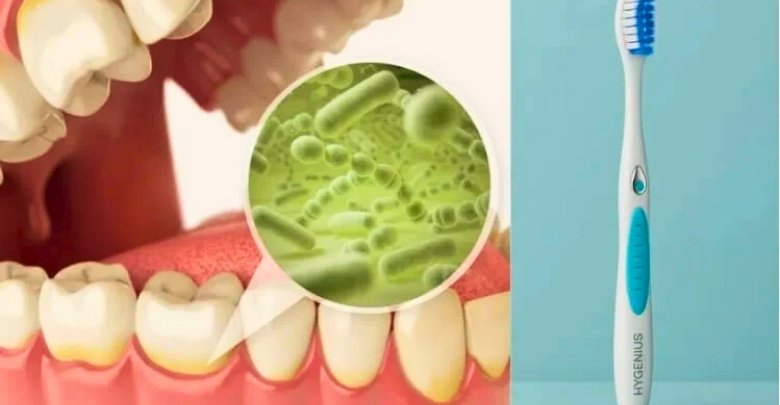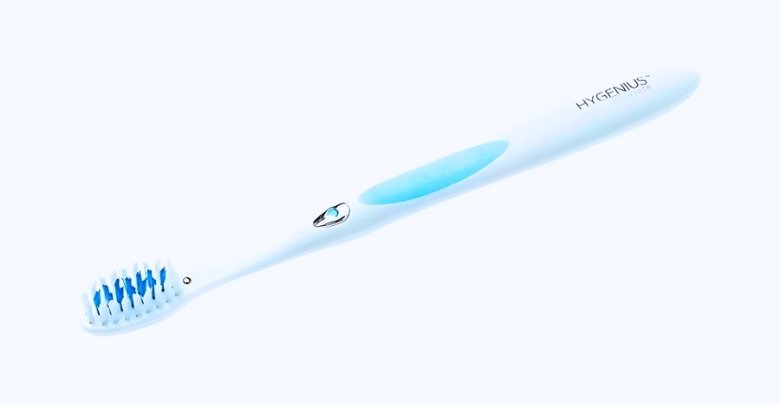The distinctive design and cleaning method of ionic toothbrushes have drawn attention. People find them different from both manual and electric ones, and that often makes them curious. Many even end up asking themselves how does an ionic toothbrush work?
Ionic toothbrushes work by releasing negative ions that weaken the bond between plaque and teeth. This makes plaque easier to remove without hard scrubbing. The brush uses light and touch, not batteries, to generate this effect. It cleans gently, protects enamel, and helps maintain gum health with daily use.
Do you want to know more about why this type of toothbrush is so different? If yes, then keep reading because this article covers everything you need. You will find every important detail about its function, safety, effectiveness, and even how to maintain it properly.
How Does an Ionic Toothbrush Work?
Ionic toothbrushes are not like ordinary brushes, and people often wonder how they really work. They use a special process that helps remove plaque in a gentle way. Instead of only depending on scrubbing, they add another step. Let’s look at how this technology makes brushing different.

Special Technology
The unique feature that sets ionic toothbrushes apart is Trillion Ion™ technology. When you hold the brush and it touches light, negative ions are released. These ions interact directly with the tooth surface to begin cleaning. This process makes brushing smoother, easier, and more effective than just scrubbing.
Plaque Behavior
Plaque usually clings to the enamel because it carries a light positive charge. This charge makes it stick strongly to the surface of your teeth. Scrubbing alone sometimes cannot fully remove it, which causes buildup. Ionic toothbrushes target this charge, making plaque easier to break away.
Bond Breaking
The negative ions released by the brush weaken the bond between plaque and teeth. This loosens the plaque, allowing it to lift away during brushing. Instead of harshly scraping, the ions do the harder part for you. This makes cleaning feel lighter and more comfortable for your mouth.
Cleaning Action
The action of these brushes feels different compared to regular manual ones. They clean by gently loosening plaque instead of scraping it forcefully. This not only reduces gum irritation but also keeps enamel safe. Many users notice a fresher and smoother feel after every use.
Natural Energy
Another benefit is that ionic toothbrushes do not rely on batteries or charging. They use natural energy from touch and light to create an ion flow. This means the brush is always ready whenever you need it. Many people find this feature convenient and easy for daily use.
Proven Benefit
Clinical research has shown that ionic brushes reduce plaque more effectively than manual ones. They also help improve gum condition and lessen swelling. Dentists often point out their role in promoting healthier brushing habits. These results make them a reliable and effective option for oral hygiene.
User Trust
Many users share their experiences of cleaner teeth and less gum irritation. They appreciate the light brushing feel while still noticing good cleaning results. If you’re interested in what others say, consider reading a Hygenius ionic toothbrush review, where people highlight its comfort and cleaning effectiveness together.
Compared Cleaning
Manual brushes depend on proper brushing technique, which not everyone follows correctly. Too much pressure can damage gums, while too little leaves plaque behind. Ionic toothbrushes make this process easier by providing support through ion action. This ensures consistent cleaning without relying heavily on brushing strength.
Long-Term Value
Using ionic toothbrushes regularly helps maintain strong enamel and healthier gums. Over time, users experience less plaque buildup and fewer gum issues. Their simple design, combined with natural energy use, makes them last longer. This gives both effective cleaning and good value for everyday dental care.
Ionic toothbrushes work by releasing ions that loosen plaque safely. Their design makes brushing more effective without putting stress on teeth or gums. They use natural energy instead of batteries for easy daily use. Overall, they are a smart and reliable brushing choice.
What Makes an Ionic Toothbrush Different From a Regular Toothbrush?
Toothbrushes may look similar at first, but the way they work can be very different. Regular manual or electric brushes clean with bristle movement, while ionic ones use ion technology to loosen plaque. The table below shows how they compare.
| Feature | Ionic Toothbrush | Regular Toothbrush (Manual/Electric) |
| Technology | Uses ionic charge to release negative ions that break plaque bonds. | Manual relies on scrubbing; electric relies on vibration or rotation. |
| Plaque Removal | Removes plaque by loosening it at the surface for easier cleaning. | Removes plaque only through physical bristle action. |
| Pressure Needed | Works effectively with very light brushing pressure. | Manual requires stronger pressure; electric reduces effort but still needs guiding. |
| Gum Sensitivity | Gentle on gums, lowers the risk of irritation or bleeding. | Can cause gum soreness or cuts if brushing too hard. |
| Enamel Safety | Protects enamel since no harsh scrubbing is required. | Scrubbing or high-speed vibrations may wear enamel over time. |
| Power Source | Activated by light and touch, often no charging or batteries needed. | Manual needs no power; electric needs charging or battery replacement. |
| Brushing Feel | Smooth, quiet, and soft brushing experience. | Manual can feel rough; electric can feel noisy and strong. |
| Portability | Lightweight, no charger required, very travel-friendly. | Manual is portable; electric requires a charger or extra heads when traveling. |
| Extra Features | May include LED light indicators for feedback. | Basic manual has no indicators; electric may include timers or sensors. |
| Cleaning Effect | Leaves a longer-lasting, smooth, and clean feeling. | Clean feeling fades quicker, especially with manual brushing. |
Both types of toothbrushes can keep teeth clean, but ionic brushes add extra support with ion technology. Choosing between them depends on your personal needs and brushing style. Many studies highlight ionic toothbrush effectiveness, showing that the charged bristles can remove plaque in ways regular brushes cannot.
Are Ionic Toothbrushes Safe for Daily Use?
Brushing every day is important for keeping teeth strong and healthy, but the type of brush you use can make a difference. Ionic toothbrushes work in a unique way, so many people wonder about their safety. Let’s look at the details clearly.

Gum Safety
Ionic toothbrushes are designed to clean without harsh scrubbing, which makes them gentle on gums. Daily use does not cause irritation, swelling, or cuts. This makes them safer than regular hard brushing, especially for people who worry about gum sensitivity over time.
Enamel Protection
The enamel is the shield of your teeth, and strong protection is important for daily brushing. Ionic toothbrushes loosen plaque without scratching or wearing down the enamel layer. This helps teeth stay safe from sensitivity and damage, even with everyday use.
Soft Tissue Care
Your cheeks and tongue are also exposed during brushing. Tests show ionic toothbrushes do not harm these soft tissues. They avoid the soreness sometimes caused by manual brushes, making them a comfortable option for long-term daily care in the mouth.
Plaque Control
Daily brushing is all about fighting plaque, and ionic toothbrushes do this well. They use gentle ions instead of heavy scrubbing to remove buildup. This means your teeth stay clean without the pressure that could harm enamel or gums over the years of brushing.
Everyday Comfort
Comfort makes daily habits easier to follow, and ionic toothbrushes are smooth to use. They don’t require hard strokes, so brushing feels light and easy. Over time, this comfort encourages regular brushing, which is key to healthy teeth and gums.
Ionic toothbrushes are safe for daily use as they protect enamel, keep gums healthy, and clean gently without irritation. Their balance of safety and comfort makes them a reliable choice for everyday dental care.
How Long Does It Take to See Results With an Ionic Toothbrush?
Switching to an ionic toothbrush makes people curious about when results appear. Some notice changes quickly, while others take a little longer. It depends on brushing habits and consistency. Let’s look at the stages where people often see differences.

Day 1
The first use feels smooth and easy, without any heavy effort. Bristles glide softly across teeth and gums, giving a fresh feeling. Teeth may feel slightly smoother after rinsing. Breath feels clean, though it might seem like a normal brushing effect.
After 3 Days
A few days in, freshness begins lasting longer after brushing is done. Afternoon gum cravings may reduce because the mouth stays cleaner. The white coating on the tongue starts looking less noticeable. Even without changes in toothpaste, the difference in freshness stands out clearly.
After 1 Week
By the end of the first week, the buildup behind the lower teeth feels reduced. The rough texture that usually appears daily seems almost gone. Gums also respond better with less irritation or bleeding. Brushing feels normal, but results appear clearer. Cleanliness seems to last throughout the day.
After 2 Weeks
Within two weeks, brushing feels natural without needing extra focus on pressure. Teeth feel polished after every use, much like a dental cleaning. Breath stays fresher even after meals. Gums remain calm, showing no soreness or swelling. Daily brushing begins to feel more effective overall.
Key Tip
Users often see results in just a few weeks, especially when following the proper way to use an ionic toothbrush daily. Consistency plays the biggest role in long-term success. Small daily improvements add up to noticeable changes in dental comfort and freshness.
Results from ionic toothbrushes appear quickly and improve within weeks. Cleaner teeth and fresher breath encourage brushing regularly. Long-term use supports gum health and enamel protection. Consistent care ensures lasting results and keeps oral health strong every day.
How Do You Maintain and Clean an Ionic Toothbrush?
Taking care of an ionic toothbrush is important if you want it to stay effective and last longer. Simple cleaning habits help the brush perform well every day. By keeping it in good condition, you also maintain better oral hygiene. Here are some useful tips you can follow.
- Rinse After Use: Always rinse the brush head thoroughly under running water after every brushing session to remove leftover toothpaste, plaque, and food particles that may stick.
- Dry Properly: Make sure to shake off extra water and leave the toothbrush standing upright to air dry, which prevents bacteria and mold from forming.
- Replace Head: Change the brush head every three months, or sooner if the bristles bend or wear out, to keep cleaning results safe and effective.
- Handle Carefully: Avoid dropping the toothbrush or pressing the bristles too hard, because strong impact or pressure can damage the ionic function and weaken its performance.
- Keep Clean Base: Regularly wipe the handle and base of the toothbrush using a clean, damp cloth to prevent dirt, toothpaste stains, or buildup over time.
- Store Safely: Place the toothbrush in a holder or cup where it can stand upright, keeping it away from crowded surfaces that could collect dust or germs.
- Avoid Sharing: Never share your ionic toothbrush with another person, since this spreads bacteria and reduces hygiene, even if the brush looks visibly clean.
- Use Clean Water: Always use clean running water when rinsing the brush head, and avoid soaking it for long periods since this weakens the bristles.
- Travel Protection: While traveling, store your toothbrush inside a protective case that allows airflow, which helps keep it safe from damage and contamination.
- Check Regularly: Inspect the brush often for any cracks, weakened bristles, or signs of malfunction, and replace parts when needed to keep performance consistent.
Keeping an ionic toothbrush clean helps it last longer and work better. Regular care ensures it removes plaque safely during daily use. Proper storage, rinsing, and replacement keep hygiene high. Following these steps makes brushing more effective.
FAQs About How Does an Ionic Toothbrush Work?
Ionic toothbrushes sound advanced, and many people are curious about how they actually clean teeth. The process is not complicated, but it is different from regular brushing. Here are some important questions and clear answers to help explain it better.
Do Ionic Toothbrushes Need Special Toothpaste?
No, ionic toothbrushes do not require special toothpaste to work properly. The ions do most of the plaque-loosening job, so regular toothpaste works fine. However, using fluoride toothpaste adds protection against cavities. This combination gives both deep cleaning and enamel strength.
How Do Negative Ions Clean Teeth?
Negative ions change the way plaque sticks to teeth. Normally, plaque clings tightly due to its positive charge. The ions break this connection, making plaque easy to remove. This process reduces the need for heavy scrubbing while brushing.
Can Ionic Toothbrushes Work in the Dark?
Yes, ionic toothbrushes can still work in low-light or dark settings. While many models use light to activate ions, touch also triggers the effect. This means brushing remains effective even without bright light. Users don’t need special lighting for results.
Do Ionic Toothbrushes Replace Scrubbing Completely?
No, you still need light brushing movements with an ionic toothbrush. The ions loosen plaque, but the bristles sweep it away. Gentle strokes are enough instead of forceful scrubbing. This makes brushing easier and more comfortable compared to manual brushing.
How Does an Ionic Toothbrush Feel While Brushing?
The brushing feels lighter and smoother compared to regular brushes. Since less pressure is needed, gums don’t feel sore afterward. Teeth often feel polished right after rinsing. Many users describe it as a softer and fresher cleaning experience.
Do Ionic Toothbrushes Need Batteries to Work?
Most ionic toothbrushes do not need batteries or charging. They use natural energy from light and your touch to release ions. This makes them always ready without extra effort. Some models may include small indicators, but the main cleaning doesn’t rely on power.
Can Ionic Toothbrushes Work With Braces?
Yes, ionic toothbrushes are safe and effective for people with braces. The ions help loosen plaque around brackets and wires. Since they require less pressure, they reduce gum irritation during orthodontic care. This makes them a helpful tool for keeping teeth clean.
Do Ionic Toothbrushes Protect Against Acid Damage?
Ionic toothbrushes help by reducing plaque, which lowers acid buildup in the mouth. Less acid means stronger enamel protection over time. While they don’t directly block acid, they reduce the main source of it. This gives teeth better long-term defense.
How Do Ionic Toothbrushes Compare to Electric Ones?
Unlike electric toothbrushes, ionic brushes don’t rely on vibration or rotation. Instead, they use ions to do the main cleaning work. This makes them quieter and gentler. Many people prefer them for sensitive gums and enamel safety.
Can Ionic Toothbrushes Be Used Daily Without Issues?
Yes, they are designed for safe daily use. The gentle ion action avoids enamel scratching and gum irritation. Using them every day only improves cleaning results. Many users see healthier gums and smoother teeth after consistent use.
Conclusion
Brushing with an ionic toothbrush is different from using a normal one because it focuses on gentle cleaning and long-term safety. Over time, users notice smoother teeth, fresher breath, and healthier gums without the need for rough scrubbing or heavy pressure.
If you’ve been asking yourself how does an ionic toothbrush work? The answer is simple. It uses negative ions to weaken the bond between plaque and enamel, making it easy to clean teeth gently without scratching or harming gums during daily brushing.
To get the best results, rinse the brush after every use, replace the head when the bristles bend, and keep it stored upright in a dry place. Small habits make a big difference, so brush daily with care—wishing you a healthy and confident smile.






